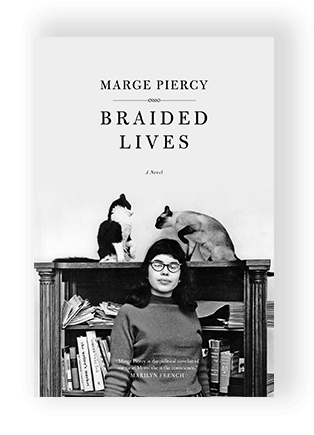Braided Lives
Marge Piercy, whose earlier novels have chronicled the female experience in the turbulent ’60s and 70s, now turns her considerable skill and passion to the 1950s in this portrait of women in transition from repression to freedom.
Through the intense friendship between Jill and her cousin, Donna, we see and feel what it was like to grow up in Detroit in the ’50s and go to college when the first seeds of freedom were sown. Through Jill’s childhood friend Howie, and her relationships with Mike and Peter, we come to understand the danger that sex posed when abortions were illegal, making the outcome of a chance encounter of a night of love a matter of life and death. And, through Marge Piercy’s brilliant, thought-provoking novel, our lives are illuminated.
“A delicious binge of a book…it’s impossible to ignore the generous spirit of this feast.”
— San Francisco Chronicle
“Braided Lives is a big, rich book. This writer just gets better and better. She is allowing more flashes of humor and more generosity…her sure novelist’s hold on making a good story, her poet’s eye for careful detail.. BRAIDED LIVES is a novel that tries not to simplify but to clarify…and by so doing, it adds a great deal to our under-standing of how things came to be as they are, and what some of yesterday might have meant.”
–Marcie Hershman, The Boston GLOBE
“It is a novel that bursts with felt life–immediate and universal–and pulsates with a rare generosity of spirit towards its characters, men as well as women.”
— Helen Yglesias
“This book demonstrates the maturation of Piercy’s native talent for story-telling…we would have to look to a French writer like Colette or to American writers of another generation, like May Sarton, to find anyone who writes as tenderly as Piercy about life’s redeeming pleasures – sex, of course, but also the joys of good food, good conversation, and the reassuring little rituals like feeding the cats, watering the plant, weeding the garden.”
— Judith Paterson, Washington Post Book World
“No writer I know has so thoroughly explored the changing, despairing, frightening, and complicated world of a young college girl becoming a woman.”
– The Washington Post

